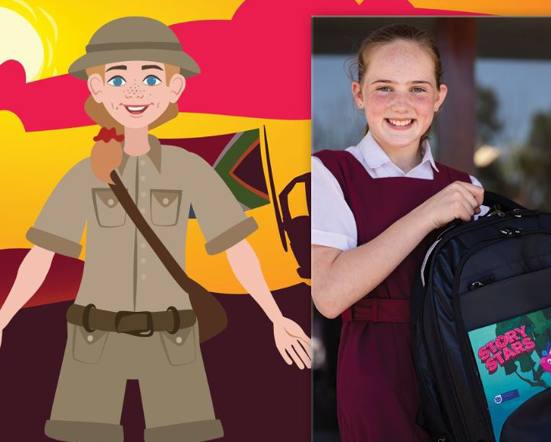Mar 2022 2nd edition
Mar 2022 2nd edition vuyelwan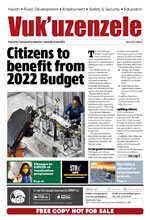
English PDF version
Translations
Afrikaans
isiNdebele
isiXhosa
isiZulu
Sepedi
Sesotho
Setswana
Siswati
Tshivenda
Xitsonga
A budget for growth and employment
A budget for growth and employment vuyelwanFrom the Union Buildings
Recently, Minister of Finance Enoch Godongwana presented a Budget that supports and reinforces the programme of action I announced in the State of the Nation Address (SONA) to grow the economy and create jobs.
The Budget provides details on how government plans to raise money and where it is going to spend that money to improve the lives of South Africans.
Few South Africans need to be reminded how devastating the COVID-19 pandemic has been for our economy.
Despite the substantial economic and social support package we introduced in 2020, businesses have gone under and as many as two million people have lost their jobs.
Many households have been spared from hunger only due to the increases in social grants.
As the pandemic has battered the economy, so it has further worsened the country’s financial position.
One of the most important tasks of this administration has been to restore our public finances to health so that government can perform its role effectively.
The only way out of this dire situation is to grow the economy. And the most effective way to reduce poverty and hunger in a sustainable way is to create employment. 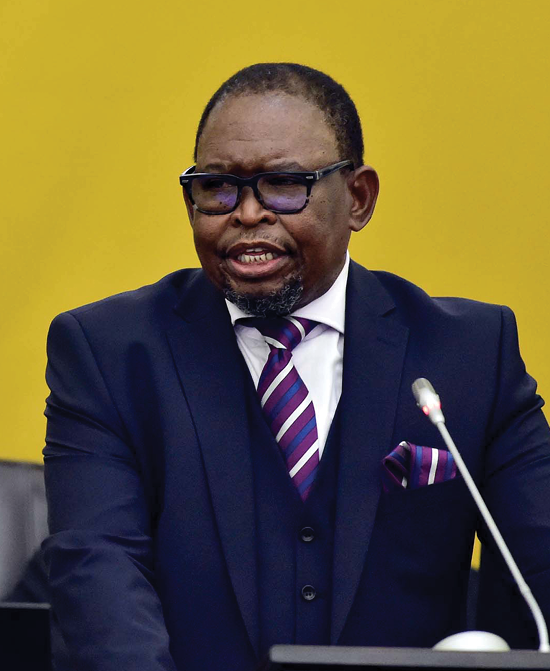
That is why the pursuit of growth and jobs is at the centre of the programme outlined in both SONA and the Budget.
This programme includes far-reaching economic reforms that promote investment and growth.
These reforms will ensure that our country has enough affordable electricity to meet growing demand, that our ports and rail lines are more efficient, that we improve access to faster, cheaper broadband, that homes and businesses have the water they need, and that we can attract the skills and investment we need to create a productive and dynamic economy.
At a time when public resources are constrained, these reforms will enable greater private investment in the vital infrastructure that our economy needs to grow.
This takes place alongside a revised framework for public-private partnerships and innovative new ways to blend public and private resources for infrastructure investment.
We will do this in a way that improves the performance and financial position of key state-owned enterprises.
This will place these enterprises in a far better position to fulfil their developmental mandates, while ensuring that critical national infrastructure remains firmly in state hands.
To support this work, R17.5 billion was allocated in the Budget for catalytic infrastructure projects over the next three years. This will, among others, support the upgrading of roads, bridges, water and sewer, transport, schools, hospitals and clinics.
The Budget supports the efforts announced in SONA to unleash the potential of small, micro and informal businesses.
For example, R15 billion has been set aside for a redesigned loan guarantee scheme that will make it easier for small businesses to access funding to ‘bounce back’ from the effects of the pandemic.
Recognising the importance of basic services both for quality of life and for investment and business activity, the Budget significantly increases the allocation for service delivery. For example, it adds an extra R30.7 billion to local government allocations for basic municipal services.
All of these measures encourage the growth and expansion of firms and support the establishment of new firms to create new jobs.
These efforts will, however, take time to absorb the millions of South Africans looking for work. We have therefore extended the Presidential Employment Stimulus, which has provided work and livelihood opportunities to over 800 000 people in its first 16 months.
An additional R18.4 billion has been allocated over the next two years so that the stimulus can continue to provide vital income, skills development and work experience to hundreds of thousands of unemployed, mostly young people.
The Budget also supports the extension of the R350 Social Relief of Distress Grant for another year. This will provide basic support for around 10 million unemployed beneficiaries as they look for work.
This grant significantly broadens the country’s social safety net, with around 46% of the population now receiving grants.
In short, this is a Budget that seeks to leave no one behind.
Even with our severe fiscal situation, the Budget directs resources to areas with the greatest potential for growth and jobs, specifically structural reform, infrastructure and support for small businesses.
At the same time, it supports young people through public and social employment programmes, and extends social protection for the most vulnerable.
Our country’s path to recovery is steep and will be extremely challenging. But with the measures we set out in SONA, with the Budget that has been presented, and with the cooperation and involvement of all South Africans, we will succeed.
Budget 2022
Budget 2022 LondekileSouth Africa’s National Budget, recently presented by Finance Minister Enoch Godongwana, shows just where government gets its money from and how it plans to spend it to improve citizens’ lives and livelihoods.
Where’s the money coming from?
R1 598.4 billion: Taxes
R386.6 billion: Borrowing
R33.3 billion: Non-tax revenue

How will it be spent?
R364.4 billion: Social development.
R301.8 billion: Debt service costs.
R298.1 billion: Basic education.
R259 billion: Health.
R236.3 billion: Community development.
R227.1 billion: Economic development.
R220.7 billion: Peace and security.
R131.6 billion: Post-school education and training.
- The value of spending on health, education, housing, social grants, transport, employment programmes and municipal services has risen from 58.2% in the 2019/20 Budget to 59.5% this year.
- R4.35 trillion: The amount public debt has risen to.
- 17 cents: The amount used out of every R1 collected in tax revenue to pay off interest.
- 2.1%: Projected growth of the economy in 2022.
Grants and financial support
18.6 million: People will be supported via social grants.
R44 billion: Allocated to the Social Relief of Distress (SRD) Grant to provide beneficiaries with R350 per month.
12 months: The number of months the SRD Grant has been extended by.
R1 985: New Old Age Grant, Care Dependency Grant and Disability Grant.
R2 005: New Old Age Grant (those over 75) and War Veterans Grant.
R1 070: New Foster Care Grant.
R480: New Child Support Grant.
R28.9 billion: Allocated to improve service delivery and uplift citizens.
Presidential Employment Stimulus
840 000: People supported through a combination of job creation, job retention and livelihood interventions.
R18.4 billion: Allocated over the next two years to provide support to 500 000 people. The focus is to provide meaningful work and livelihood opportunities, particularly for unemployed youth.
……………………………………………………………………………………………………
Job creation
R3.33 trillion: Allocated to the social wage, to support vulnerable and low-income households.
R76 billion: Allocated for job creation programmes over the medium-term.
R20 billion: Set aside for a business bounce-back scheme to support businesses in distress.
200 000: Hectares of land leased by the Department of Agriculture, Land Reform and Rural Development to prioritised groups, supporting job creation and small enterprises.
……………………………………………………………………………………………………
Education
R32.6 billion: Allocated for financial support to current bursary holders and first-year students under the National Student Financial Aid Scheme.
R24.6 billion: Allocated to provincial education departments to address shortfalls in teacher compensation.
|
COVID-19 and health Two years: The time that South Africa has been struggling with the COVID-19 pandemic and economic recession. 2.1 million: Jobs lost as a result of COVID-19 in the first quarter of 2020. R2.3 billion: Allocated to buying additional COVID-19 doses and administering vaccines. R15.6 billion: Allocated to provincial health departments to fight COVID-19 and meet shortfalls in essential supplies. R3.3 billion: Allocated to absorb medical interns and community service doctors. |
Infrastructure
R595 billion: Allocated to 55 infrastructure projects to improve the economy’s ability to grow quickly.
R812.5 billion: Estimated public sector infrastructure spending over the next three years. Municipalities are expected to spend R185.5 billion and R194.4 billion on infrastructure over the same period.
R44.3 billion: The value of public housing expected to be built through the Human Settlements Development Grant in provinces, which will be transferred to homeowners.
Three years: The time period in which government will expand electricity-generation capacity, upgrade and expand the transport network, and improve sanitation and water services. It will also continue to maintain and improve health and education infrastructure.
Fighting corruption
R8.7 billion: The amount the police budget has increased by.
R1 billion: Will be used to implement personnel reforms.
R1.1 billion: Increase in Department of Justice and Constitutional Development’s budget.
R39.9: Increase in Office of Chief Justice’s budget.
……………………………………………………………………………………………………
Alcohol, tobacco and sugar increases
11 cents: More for a can of beer or cider.
17 cents: More for a 750ml bottle of wine.
76 cents: More for a bottle of sparkling wine.
R4.83: More for a bottle of spirits.
R1.03: More for a packet of cigarettes.
37 cents: More for 25 grams of piped tobacco.
2.31 cents: More per gram of sugar.
……………………………………………………………………………………………………
Levies and fuel tax
R3.85: Fuel levy for petrol, per litre. This has not been increased.
R3.70: Fuel levy for diesel, per litre. This has not been increased.
Changes to COVID-19 vaccination programme
Changes to COVID-19 vaccination programme vuyelwanThe Department of Health has announced changes to the vaccination programme as part of ongoing efforts to increase uptake of the Coronavirus Disease (COVID-19) vaccine in South Africa.
The changes, which have been guided by scientific evidence, include reducing the time interval between the first and second doses of the Pfizer vaccine from 42 days to 21 days.
“All individuals who are fully vaccinated with the Pfizer vaccine, meaning they have received both doses, will now be eligible for the booster dose 90 days (or three months) after the second dose,” the department said. 
Previously the booster dose was administered 180 days (or six months) after the second dose.
Those above the age of 18, who receive one dose of the Johnson and Johnson (J&J) vaccine, are now eligible to receive a booster dose of the same vaccine or a booster dose of the Pfizer vaccine after an interval of two months (60 days).
Individuals above the age of 18, who receive two doses of the Pfizer vaccine, are now eligible to receive a booster dose of the same vaccine or a booster dose of the J&J vaccine at least 90 days (three months) after the second dose.
“This is called heterologous booster doses, meaning booster doses of a different vaccine to that which was administered as the primary dose,” explained the department.
The decision regarding which vaccine to administer as a booster should be guided by vaccine availability, added the department.
“If both vaccines are available at vaccination site, homologous boosting should be preferred, unless the vaccine requests to receive a heterologous or different booster dose, or has a history of experiencing an adverse event following immunisation.”
The department encouraged South Africans to get vaccinated because vaccines remain the most effective weapon against the pandemic and provide protection against COVID-19 infection.
SAnews.gov.za
Citizens to benefit from 2022 Budget
Citizens to benefit from 2022 Budget vuyelwanThe 2022 National Budget brought good news to South Africans as government has reiterated its commitment to making the lives of citizens better.
This will be done by supporting vulnerable and low-income households; improving education, health and capital investment; addressing service delivery challenges; providing tax relief; and continuing the fight against crime and corruption.
Finance Minister Enoch Godongwana said government needs to strike a critical balance between saving lives and livelihoods, while supporting inclusive growth. “This budget presents this balance,” he said.
Over the next three years, R3.33 trillion has been allocated to the social wage, to support vulnerable and low-income households; and, over the medium-term, R76 billion has been allocated for job creation programmes. 
“This year, an additional R18.4 billion has been made available for the Presidential Employment Initiative,” the Minister added.
Social grant increases
The Department of Social Development will receive R58.6 billion over the medium-term to initiate a new extended child support grant for double orphans; provide for inflation increases to permanent social grants; and extend the Social Relief of Distress (SRD) Grant.
The increases are as follows:
- Old age, war veterans, disability and care dependency grants increase by R90 in April 2022, and a further R10 in October 2022;
- Foster care and child support grants increase by a once-off R20 in April 2022.
In addition, R44 billion has been allocated for the 12-month extension of the R350 SRD Grant.
Uplifting citizens
In 2017, government announced a policy for fee-free higher education. An additional R32.6 billion has been allocated for financial support to current bursary holders and first-year students under the National Student Financial Aid Scheme.
In addition, R24.6 billion has been allocated to provincial education departments to address shortfalls in teacher compensation.
Provincial health departments will receive an additional R15.6 billion to support their continued response to COVID-19, bridge shortfalls in essential goods and services. About R3.3 billion has been allocated to absorb medical interns and community service doctors.
An amount of R28.9 billion has been allocated to improve service delivery and uplift citizens. “Basic municipal services require more support, especially for the poor,” Minister Godongwana said.
Fighting corruption
The police budget has increased by R8.7 billion, and R1 billion will be used to implement personnel reforms.
In addition, the Department of Justice and Constitutional Development’s budget has increased by R1.1 billion, while the Office of the Chief Justice receives R39.9 million more.
Tax relief
“Now is not the time to increase taxes and put the recovery at risk. Accordingly, we have decided to keep money in the pockets of South Africans,” the Minister said.
As such, R5.2 billion in tax relief will help support economic recovery, provide some respite from fuel tax increases and boost incentives for youth employment.
Personal income tax brackets and rebates will be adjusted by 4.5%, in line with inflation.
The annual tax-free threshold for people under 65 will increase from R87 300 to R91 250. Medical tax credits will increase from R332 to R347 per month for the first two members, and from R224 to R234 per month for additional members.
No increases will be made to the general fuel levy on petrol and diesel for 2022/23. “This will provide tax relief of R3.5 billion to South Africans.”
There will also be no increase in the Road Accident Fund levy.
Economic reconstruction and recovery
The Minister said that it is only through sustained economic growth that South Africa can create enough jobs to reduce poverty and inequality, and reach its goal of a better life for all. The Economic Reconstruction and Recovery Plan (ERRP) thus remains essential to growth.
“We are accelerating the implementation of critical structural reforms contained in the ERRP, in particular, in electricity, rail, ports and telecommunications.”
To complement these interventions, government will accelerate infrastructure investment, which is the backbone of a thriving economy.
“As we upgrade roads, bridges, water and sewer, transport, school infrastructure and hospitals and clinics, the aim is to unlock higher levels of employment for those involved in the projects,” the Minister said.
A provisional allocation of R17.5 billion has been set aside over the medium term.
Supporting SMMEs
A business bounce-back scheme of R20 billion is being launched to support businesses in distress.
The scheme will include small business loan guarantees of R15 billion, which will be launched in March 2022; and, by April, a business equity-linked loan guarantee support mechanism will be introduced.
Alcohol, tobacco and sugar increase
Excise duties on alcohol and tobacco have increased by between 4.5% and 6.5%, as follows:
- A 340ml can of beer or cider: 11 cents;
- A 750ml bottle of wine: 17 cents;
- A bottle of sparkling wine: 76 cents.
- A bottle of spirits: R4.83;
- A packet of cigarettes: R1.03;
- Twenty-five grams of piped tobacco: 37 cents.
The health promotion levy has been increased to 2.31 cents per gram of sugar.
Family hatches business with grant money
Family hatches business with grant money LondekileFive young people from an Eastern Cape rural town are breeding success after putting their Social Relief of Distress (SRD) Grant to good use.
The cousins from Nobumba Village in Peddie used their monthly R350 SRD grant to start the Bayeni Poultry Cooperative, which sells broiler chickens to surrounding villages and the town of Makhanda.
Bayeni chairperson Phumlisa Ngabase (26) explains that when the cousins lost their jobs because of the COVID-19, they had to find a way to put food on the table in the long-term.
“Our vision was to get up and do something for ourselves,” Ngabase says.
Determined to change their fortunes, the cousins built a chicken house using mud bricks that they made.
They also received assistance from the Eastern Cape Department of Rural Development and Agrarian Reform (DRDAR), which donated 10 bags of feed and 150 day-old chicks, a plucker machine and water tanks.
Apart from the donations, DRDAR also trained the youngsters.
"DRDAR officials gave us information packs about the different stages of growing chickens and the types of feed to use at each stage," Ngabase says.
Members of the cooperative also received information about registering a cooperative and applying for assistance from the department.
“We are constantly in touch with our extension officer for advice,” says Ngabase.
“The assistance we have received from the department has minimised our challenges, and we are starting to see profits.”
Ngabase says that they chose the agriculture sector because it offers endless opportunities for young people.
Eastern Cape MEC of Rural Development and Agrarian Reform Nonkqubela Pieters says the Bayeni Poultry Cooperative has done commendable work.
“They have changed R350 monthly grants into an investment.”
MEC Pieter adds that the DRDAR recently donated 400 chicks and 15 bags of feed, 2 400 vegetable seedlings, 10 wheelbarrows, 20 bags of pig feed, garden tools and a plucker machine to 17 other youth projects in Peddie.
Emerging farmers wanting to receive similar assistance, should contact DRDAR’s extension services at 043 602 5006/7 or visit www.drdar.gov.za
Fulbright scholarship offers brighter future
Fulbright scholarship offers brighter future vuyelwanApplications are open for the South African Fulbright Foreign Student Scholarship Programme.
The scholarship funds postgraduate study at a United States (US) university in any subject, excluding an MBA or studies that require contact with patients.
The (US) government and South Africa’s National Research Foundation fund the scholarship, which covers two years’ tuition fees and living expenses in the US.
Frank Whitaker, the Minister Counsellor for Public Affairs at the US Embassy in Pretoria, says the programme has benefitted more than 2 100 South Africans.
“After completing their studies, Fulbrighters return home where they make huge differences in their communities and transfer skills that continue to contribute to the development and economic growth of South Africa,” he says. 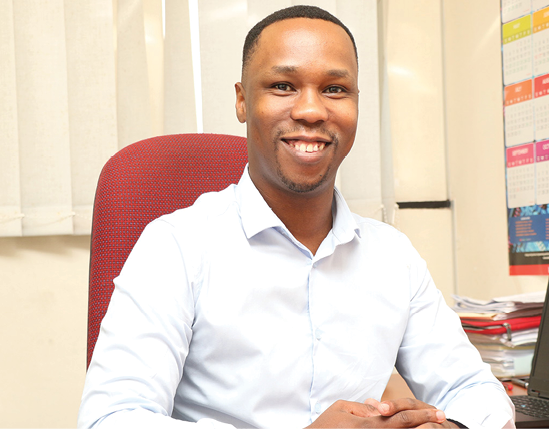
One such success story is 35-year-old Dr Mzamo Shozi from the University of KwaZulu-Natal. Shozi, who hails from Umlazi in KwaZulu-Natal, holds a PhD in Chemistry and specialises in catalysis and organometallic chemistry research. He was awarded the scholarship in 2018 to do chemistry research at the University of California.
“I grew up in a township with little to no opportunities. I guess I see myself as one of the examples of ‘it doesn’t matter where you come from’. You can be what you want to be when you work hard for it.”
He says the programme provided him with the chance to accumulate international experience.
How to apply
South Africans wishing to pursue a master’s degree must have completed a four-year B-Tech degree or a three-year bachelor's degree with an honours degree. Prospective doctoral students must have successfully obtained a master’s degree.
Successful applicants will start their Fulbright studies in August 2023.
“We encourage talented South African students, graduates, and young professionals to apply for this once-in-a-lifetime academic exchange programme and to join the Fulbright family of change-makers,” says Whitaker.
Applications for the Fulbright Foreign Student Programme close on 1 May 2022.
To apply or for more information, visit za.usembassy.gov/ education-culture/ fulbright-postgraduate/or email fpsa@state.gov
Furniture maker is no couch potato
Furniture maker is no couch potato LondekileA recipient of the Social Relief of Distress Grant is sitting pretty after using her monthly R350 to start Lady Q Designs, a furniture-making business.
Single mother Maquoalesa Lekheakhoa Qwali (27), from Bethlehem in the Free State, used her artistic flair and entrepreneurial spirit to make a couch from old tyres.
“I’ve always wanted to start a business. When President Cyril Ramaphosa announced the R350 grant, I told myself that this was the perfect time to get started. I was sitting at home unemployed when I got the inspiration for the business,” she says.
“We always complain about needing capital. My capital was my R350 government grant. We must make the most of these scarce resources.”
Qwali’s ideas were inspired by YouTube videos. She used her grant money to buy a second-hand power drill and couch stapler.
The rest of her equipment was found at home – old wooden boards and clothes that she used to cover her first couch.
She was not happy with her first attempt and went back to the drawing board and kept on trying until she succeeded.
“Once I made a sofa that I was happy with, I started advertising my services and got an order for a two-seater couch.”
Since then, she has sold her furniture to residents of Bethlehem and other parts of the Free State. She says customers pay a deposit, which she uses to buy the materials she needs.
Qwali also does re-upholstering of old couches and invests her profits into growing the business by buying additional equipment.
She also supports her child and grandmother.
One of her challenges is pricing her furniture properly, so that her products are affordable but her business does not run at a loss.
Qwali's couches are sold from R1 500.
She has also learnt that waiting for start-up funds can sometimes kill dreams. People need to take a leap of faith and start a business, she advises.
Gogos go digital
Gogos go digital UrsulaTech-savvy gogos can now help their grandchildren do the research they need for school, thanks to the goGOGOgo non-profit organisation. 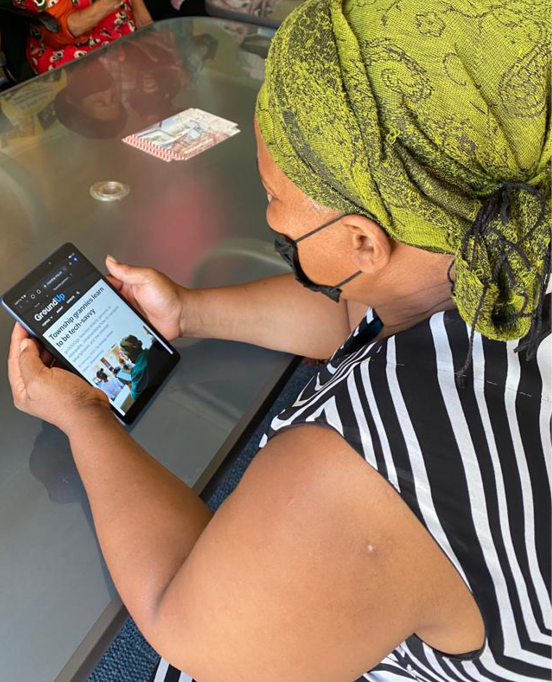
It teaches retired, elderly women how to use smartphones and the internet to better their lives and connect to the rest of the world.
Dudu Machethe (70), a resident of Alexandra near Johannesburg, says she is now able to help her grandchildren with schoolwork; communicate with friends and relatives in KwaZulu- Natal; pay her DStv subscription; and do her banking from the comfort of her home.
“goGOGOgo also taught us how to use the internet to verify information about the Coronavirus Disease.
“When people say the vaccine is a conspiracy, I can now Google the correct statement and show it to them,” says Machethe.
She adds that gogos who join the programme are able to keep confidential letters private, because they are taught how to use email and no longer have to ask other people to send letters on their behalf.
The founder of the goGOGOgo, Jane Simmonds, says they are supporting gogos to be agents of change, empowering them to promote meaningful, positive health outcomes for themselves, the children in their care and their communities.
“Our activities include workshops, skills devel-
opment and income-generating projects aimed at uplifting and empowering gogos and their communities,” Simmonds says.
She started goGOGOgo in 2014 after being asked to talk to gogos in Alexandra about HIV and Aids.
After the session, she was approached by a gogo who was looking for ways to talk about sex with her grandchildren. Simmonds realised how being taught basic tech skills would empower gogos to learn more about a variety of topics.
Simmonds says two groups of gogos have been trained at the Itlhokomeleng Home for the Aged in Alexandra.
The course runs for eight weeks, with two, two-hour lessons a week.
She says they are working on expanding the programme to other areas in Johannesburg, KwaZulu- Natal and Cape Town.
Gogos who want to join the Alexandra programme can visit the Itlhokomeleng Home for the Aged or go to www.go-gogo-go.org. za. Alternatively, send an email to jane@ go-gogo-go.org.za or call 083 230 3655.
HPV vaccines help prevent cancer
HPV vaccines help prevent cancer UrsulaGirls as young as nine may be vaccinated against the human papillomavirus (HPV). The vir us can lead to cervical cancer – the leading cause of cancer-related deaths.
To protect girls, an annual HPV vaccination programme was first rolled out in 2014, as part of the Integrated School Health Programme. The programme, led by the departments of Health, Basic Education, and Social Development provides the vaccine free of charge to learners in Grade 5 who are over the age of nine.
To be fully protected, two doses (a minimum of five months apart) are offered annually to girls.
Vaccines are administered by trained professional nurses who are employed by the Department of Health.
What is HPV?
HPV is a common viral infection of the reproductive tract. It lives on the skin and can be transmitted through skin-to-skin contact.
According to the National Department of Health, close to 80% of cervical cancers are caused by HPV.
“Cervical cancer is a preventable disease. An effective and affordable way of preventing this is through vaccination against the HPV,” says the department.
Getting vaccinated
In the Western Cape, Sister Beatrice Groenewald, the Overberg District child health coordinator, says her team works hard to ensure as many girls as possible are vaccinated.
She says they send parents consent forms and information pamphlets in local languages. The pamphlet contains frequently asked questions.
“This enables them to familiarise themselves with the key facts – that the HPV vaccine is safe and effective, and that it is different from the Coronavirus Disease vaccine – to help them make an informed decision.”
Elize Joubert, CEO of the Cancer Association of South Africa, says the organisation supports the programme.
“One must remember that there is no cure or treatment for the virus. So making it possible for their girl child to be vaccinated essentially is making sure that their girl child is protected for the rest of her life against HPV infection,” she says.
The first round of this year's vaccination programme ends in March. The second round will take place from 2 September to 31 October.
For more information on HPV, visit www.cansa.org. za or call the toll-free number 0800 22 66 22. For HPV vaccination information, contact your nearest provincial health care facility, which you can find at www. health.gov.za.
Johannesburg builds a new generation of engineers
Johannesburg builds a new generation of engineers vuyelwanPupils from Johannesburg schools are being given the chance to enter the exciting world of engineering through the Next Engineers programme.
The initiative is being led by the General Electric (GE) in partnership with the Gauteng Department of Education, human development organisation FHI360 and Pr otec, a non-profit organisation involved in science, technology, engineering, and maths education.
The programme was launched recently and the first batch of pupils who will participate in the programme have been already been identified.
Kwa-Mahlobo Secondary School pupil Omphile Chemvo (18), one of the 550 pupils participating in after-school engineering classes, said the programme will help introduce him to the basic principles of engineering. He intends studying aerospace engineering after matric.
GE Southern Africa CEO Nyimpini Mabunda said the programme raises awareness of engineering careers from as early as age 13 (Grade Eight), ignites interest throughout high school (ages 14 to 18), and alleviates financial barriers to higher education through financial support.

He said about 1 100 students applied to be among the first to participate in the programme’s three pillars – Engineering Discovery, Engineering Camp and the Engineering Academy.
“As we slowly start recovering from the Coronavirus Disease pandemic, it is evident that we require more diverse solutions that will contribute to the growth of the economy.”
Mabunda said through GE’s Next Engineers programme, future engineers and changemakers are being exposed in solving challenges.
“We are playing our part in increasing the representation of females in the engineering sector,” he said.
Engineers provide critical skills
Gauteng MEC for Education Panyaza Lesufi said that over the next five years, more than 3 500 students between the ages of 13 and 18 will get hands-on exposure to engineering concepts and careers. Ultimately, they may be given financial help to obtain engineering degrees.
“The engineering sector has a critical role to play in ensuring that Gauteng achieves its goals as articulated in the Growing Gauteng Together Vision 2030,” said MEC Lesufi.
The GE Foundation has invested $2.5 million (over R38 million) in the Johannesburg programme.
This will cover the costs of Protec, which is tasked with implementing and growing the programme; providing financial support for up to 150 Engineering Academy participants; and funding for tuition for 800 youth to attend the Engineering Camp.
Engineering classes are expected to start in March and first camp is scheduled for the June school holidays.
For more information about the programme, go to www.nextengineers.org/cities/johannesburg.
Looking for a government job?
Looking for a government job? UrsulaMaking local government work
Making local government work vuyelwanPresident Cyril Ramaphosa says councillors and local governments must address service delivery with urgency and to turn local government around.
The President made the remarks at the opening session of the sixth national conference of the South African Local Government Association recently.
The conference is one of the biggest gatherings of all three spheres of government, civil society, business and other stakeholders in the country – bringing together officials from some 257 municipalities across the country.
“Local government is where you can make the biggest difference in the lives of our people," he said.
The President added that local government is the most important enabler of economic growth and development.
“I have no doubt that each one of us understands the urgency of this moment. Let us turn adversity into opportunity. Let us turn local government around,” President Ramaphosa said.
He added that “commendable progress” has been made through the provision of water, sanitation and other basic services to communities, saying that improvement requires a concerted effort from each municipality and its leadership.
Municipal challenges
The President painted a picture of the challenges municipalities are facing while attempting to provide services to the communities they serve.
According to the President:
- A government report shows that only 5% of the country’s municipalities are financially stable;
- Other municipalities are in financial distress, with insufficient revenue to meet their expenses;
- Some 64 municipalities are considered to be dysfunctional;
- At least 31 municipalities are currently under administration.
“This dysfunction is rooted in poor governance, weak institutional capacity, poor financial management, corruption and political instability. Many residents have lost faith in the ability of local government to meet their needs.”
He called on government leaders to correct failures and guide municipalities towards sustainability, efficiency and clean governance.
District Development Model
President Ramaphosa reiterated government’s commitment to implementing the District Development Model (DDM), which is aimed at improving coordination between the three spheres of government and its social partners.
He said the DDM is helping to grow local economies, create jobs and deliver services better and faster.
“Through this model, we aim to energise our entire system of cooperative governance, and bring coherence to planning and implementation.”
The President explained that as part of the DDM, the Department of Cooperative Governance is drawing profiles for each district and metro, which highlight the “challenges and opportunities” in those communities.
These profiles will provide the basis for the ‘One Plan’ of the metro or district, which is an intergovernmental plan.
“Through these One Plans, we are forging innovative partnerships with communities, businesses and other stakeholders to improve and accelerate implementation of key development projects.
“We are looking to the DDM to help put South Africa on a new path of socio-economic and transformation,” he said. SAnews.gov.za
Measures to prevent learner pregnancy
Measures to prevent learner pregnancy UrsulaBasic Education Minister Angie Motshekga says the education sector is working with role players and parents to prevent pregnancies among school children.
The Minister said interventions such as ‘Let’s Talks EUP’, implemented with support from United Nations Educational, Scientific and Cultural Organization (UNESCO), allow for a safe space for intergenerational dialogue on how best to deal with early and unintended pregnancy (EUP).
The curriculum is also being used to address EUP.
“Our commitment is to strengthen the Comprehensive Sexuality Education offering in Life Orientation to ensure that learners are empowered with knowledge and skills to make informed decisions about their health and sexuality, prevent HIV infection and pregnancy, and focus on their education,” said Minister Motshekga during the Social Cluster media briefing held recently.
She added that where early pregnancy occurs, the Policy for the Prevention and Management of Learner Pregnancy will help the sector to support the pregnant learner.
The policy guides teachers, parents and all those involved to ensure that care and support is provided to pregnant learners and their education is not negatively impacted.
The Department of Basic Education launched the Policy for the Prevention and Management of Learner Pregnancy in Schools recently, following alarming statistics of 23 000 young girls, between the ages of 10 and 19, who fell pregnant between April 2020 and March 2021.
Minister Motshekga called on parents, caregivers and community members to help the sector ensure that children are protected. "... especially because most of the time, pregnancy among children usually occurs as a result of sexual abuse and coerced sexual intercourse and sexual abuse.”
Social protection system
During the media briefing, the Social Cluster lauded the social protection system as one of the greatest achievements of the democratic government, reaching more than 18 million people every month.
Minister Motshekga said without this support, millions more people would live in dire poverty.
Since the onset of the Coronavirus Disease (COVID-19), the Social Relief of Distress Grant has provided support to more than 10 million unemployed people, who remain most vulnerable to the impact of the pandemic.
During his recent State of the Nation Address, President Cyril Ramaphosa announced that government has extended the R350 SRD Grant for a further year, to the end of March 2023.
During this time, government will engage in broad consultations and detailed technical work to identify the best options to replace this grant. - SAnews.gov.za
Provinces highlight plans for 2022
Provinces highlight plans for 2022 LondekileFollowing President Cyril Ramaphosa’s recent State of the Nation Address, each province presented their 2021 achievements and plans for 2022. Vuk’uzenzele shares some highlights from the State of the Province Addresses.
Gauteng
Premier David Makhura said:
- Growing Gauteng Together 2030 (GGT2030) was introduced to double the size of Gauteng’s economy and the number of people employed.
- GGT2030 aims to increase exports to the continent, drastically reduce poverty and promote economic empowerment.
- The need to improve and maintain infrastructure is important for the province to reach its service delivery, employment and economic growth targets.
- The focus is on completing projects and accelerating the completion of new infrastructure projects.
- Seven Agriparks are in operation, which have created 75 permanent jobs and 300 temporary jobs.
- Production tools were distributed to 3 876 homesteads and 339 community food gardens.
Western Cape
Premier Alan Winde said:
- A new Department of Infrastructure will be created, through the merger of the Human Settlements Department and specific components of the Transport and Public Works Department, including the property portfolio and road programmes.
- A Violence Prevention Unit will be established.

- Police oversight will be ramped up.
- An extended jobs cabinet will be set up.
- Five mega health infrastructure projects will take place over the medium-to-long-term.
- The province will focus on recovering lost learning time.
- The province will focus on supporting the vulnerable, with improved social services, using an all-of-society approach.
Northern Cape
Premier Zamani Saul said:
- Addressing unemployment, corruption and lack of infrastructure deve¬lopment are amongst the province’s top priorities.
- Special Investigating Unit offices have been set up.
- There will be incre¬ased spending on social infrastructure, with more rural roads upgraded.
- More people have access to third and fourth generation wireless telecommunications technology, due to investment by MTN and Vodacom.
- Procurement to local enterprises increased from 34% to 47% (over R1.2 billion).
- The province reflected a positive bank balance, of over R300 million, for the first time in four years.
Eastern Cape
Premier Lubabalo Oscar Mabuyane said:
- The Provincial Medium-Term Strategic Framework is being implemented to address unemployment, poverty and inequality.
- Eight major road infrastructure projects, worth R3.1 billion, have been completed.
- Despite the Coronavirus Disease (COVID-19), over 4 500 job opportunities were created.
- Work packages worth over R5.5 billion were allocated to 696 black-owned contractors.
- An investment pipeline of R1.4 billion has been signed.
- R417.4 million has been invested in 107 agricultural initiatives across the province.
- Over 278 000 youth have benefitted from various development initiatives.
Mpumalanga
Premier Refilwe Mtsweni-Tsipane said:
- A new plan to respond to the effect of COVID-19 on the economy is being implemented – the Mpumalanga Economic Reconstruction and Recovery Plan.
- The province will continue to improve the lives of rural and farming communities by providing training for aspirant farmers. Over 4 000 farmers have already been assisted, and about 150 will be provided with farming land after training.
- Mpumalanga Youth Development Fund: Forty-four applications have been approved for funding; and a unit will be established under the Mpumalanga Economic Growth Agency to focus on fundraising.
- Rural development: Over 4 550 farmers have received skills development training, and 500 were selected for AgriSETA-accredited skills development programmes. Young aspirant farmers are being placed on their own farms.
Limpopo
Premier Stanley Mathabatha said:
- Stimulating the local economy will take precedence, with large-scale projects, including the rollout of broadband and developments in the Musina-Makhado Special Economic Zone (SEZ).
- The Municipal Infrastructure Budget is a key factor in promoting service delivery.
- Individuals implicated in the Special Investigative Report will be held accountable.
- Over R4 billion has been budgeted for the construction of an academic hospital with 488 beds.
- Bridge 6116 in Makuleke is 99% complete.
- The designation of the Fetakgomo- Tubatse SEZ is at an advanced stage.
- The province delivered 3 108 houses to the poor and needy.
KwaZulu-Natal
Premier Sihle Zikalala said:
- Focus areas for 2022 will be working better and faster by prioritising economic recovery and creating jobs. The province will also scale up access to water and sanitation, fighting crime and building safer communities, social protection and human development.
- The province is completing 2 767 houses.
- The Expanded Public Works Programme created 181 244 job opportunities, and 139 422 full-time opportunities.

- New investments of R5.5 billion created 8 875 jobs.
- The KwaZulu-Natal Youth Empowerment Fund commitment has increased from R50 million (2019) to R100 million to aspiring youth entrepreneurs.
Free State
Premier Sisi Ntombela said:
- Agriculture is a cornerstone of the economy.
- R100 million will be used to develop on-farm infrastructure, including irrigation schemes, mechanisation, farm buildings and agri-processing.
- R53 million will be spent creating 300 jobs through the Township Revitalisation Programme.
- Twelve townships roads in various areas will be completed.
- Through the EPWP, 54 080 jobs were created by the third quarter of the 2021/22 financial year.
North West
Premier Kaobitsa Bushy Maape said:
- The province’s unemployment rate is 35.7%, with youth unemployment of 63%. To address this, the province is engaging with economic sectors to develop a common platform to address economic growth and job creation.
- A Provincial Jobs Summit will be held in May.
- A total of 12 494 jobs will be created across all infrastructure delivery departments through the EPWP.
- Agricultural production and associated agro-processing will be grown via the Crop Massifi¬cation Programme, finalising the Irrigation Master Plan, engaging in the production of new crops, and cultivating arable land.
- Efforts will be pursued to establish the Bojanala SEZ.
R24 billion allocated to infrastructure projects
R24 billion allocated to infrastructure projects UrsulaPublic Works and Infrastructure Minister Patricia de Lille says R24 billion has been allocated to the Infrastructure Fund for blended finance projects that will include student accommodation and social housing. 
Minister De Lille said this while providing an update on progress made over the past year on various projects in the Infrastructure Investment Plan.
“In August 2019, following a Cabinet approval, the Infrastructure Fund was announced as a ring-fenced division of the Development Bank of Southern Africa," said Minister De Lille.
The Infrastructure Fund was operationalised in 2020 with a commitment of R100 billion from government over a 10-year period.
Minister De Lille said projects are approved by the Infrastructure Fund for blended finance with contributions from the fund and the remainder to come from the private sector.
The Infrastructure Fund pipeline projects that were submitted for Budget Facility for Infrastructure (BFI) consideration, include:
- For the 2021 Adjustment Budget, four student housing infrastructure projects delivering 9 500 beds at a cost of over R3 billion was considered. The BFI approved R900 million from the Infrastructure Fund over two financial years.
- For the 2022 Budget, a social housing programme worth R1.1 billion. The BFI approved an amount of R304.5 million over the next two financial years.
- Lepelle Northern Water with a total project cost of R4.5 billion. The BFI approved an amount of R1.4 billion over the next three financial years.
The Infrastructure Investment Plan forms a central part of the Economic Reconstruction and Recovery Plan aimed at stimulating economic growth and job creation.
The projects within the Infrastructure Investment Plan were gazetted as Strategic Integrated Projects (SIPs), in line with the Infrastructure Development Act, in July 2020.
“The projects have been gazetted as SIPs to contribute to economic growth by reviving the construction sector and creating much needed jobs for people,” said Minister De Lille.
She added that the Infrastructure Investment Plan was highlighted as the ‘flywheel to economic growth’ by the President and contains 62 projects across the country in various sectors which are at various stages. - SAnews.gov.za
SA gears up for investment conference
SA gears up for investment conference vuyelwanTrade, Industry and Competition Minister Ebrahim Patel has hailed the South Africa Investment Conference (SAIC) for the massive investments it is bringing into the country.
South Africa will host its fourth SAIC in Johannesburg on 24 March 2022. The three previous conferences have resulted in significant progress towards the country’s investment targets.
“President Cyril Ramaphosa in 2018 committed to raising over R1.2 trillion worth of investments over a five-year period, and hosted three annual investment conferences, at which he set out the policy context and reforms, and the private sector provided feedback and made pledges to invest.
“Pledges received in the first three investment conferences amounted to roughly 64% of the five-year Investment Mobilisation Drive target of R1.2 trillion,” said the Minister.
At the third SAIC, pledges of about R774 billion were made.
Of the 152 investment announcements made previously, 45 projects have already been completed.
This means that the construction of the facility has been completed, or where it involves new machinery or equipment, these have been procured and installed; or that production has started.
A further 57 projects are currently under construction. Fifteen projects are either progressing slowly or have been put on hold due to the impact of the Coronavirus Disease or economic factors, Minister Patel said.
“As of February 2022, those firms that have completed their reporting have advised that R314 billion (40.6%) of the committed investment pledges have been expended,” he added.
Companies back investment drive
Takalani Netshitenzhe, the Chief Officer: External Affairs at Vodacom, said four years ago at the first SAIC, the company pledged to invest R50 billion on fibre and mobile networks over a period of five years.
“We are living up to our pledge,” she said.
Naspers Director of Cooperate Affairs Helen Ndlovu said the company is committed to this year’s SAIC as a means of promoting South Arica as an attractive investment destination and re-establishing confidence in the economy.
Ndlovu added that Nasp-ers recognises the value of investment in unlocking the potential of South African companies and the role of these companies in creating jobs, stimulating growth and encouraging investor confidence.
“As Naspers, we have seen first-hand what the right investment, business support and partnerships can do in growing tech start-ups and also what the requisite digital skills training, opportunities and experience can do for young graduates entering the workplace,” said Ndlovu.
During the first conference in 2018, Naspers pledged R4.6 billion to invest in new technology start-ups and grow its existing South Africa businesses.
Pledges at previous conferences include pharmaceutical company Aspen’s R3.4 billion at the 2018 SAIC.
Aspen has already provided Africa with much of its first vaccine manufacturing capability (for the Johnson & Johnson vaccine), with an estimated 160 million doses produced in South Africa.
In 2018, Bidvest also announced a R1-billion investment in a liquefied petroleum gas (LPG) storage facility in Richards Bay. The 22 600 ton LPG storage facility has been commissioned and is the region’s largest import terminal.
Social cohesion tops Human Rights Month agenda
Social cohesion tops Human Rights Month agenda UrsulaHuman Rights Month commemorations will contribute to social cohesion and nation building through a series of dialogues and events planned for the duration of March. 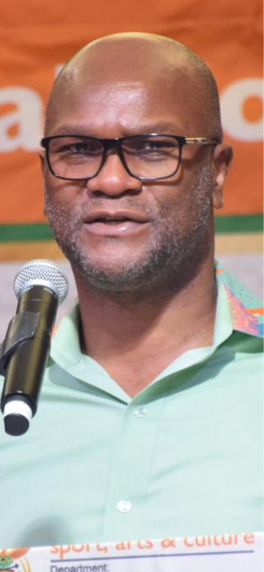
Sport, Arts and Culture Minister Nathi Mthethwa recently launched Human Rights Month in Tshwane.
As part of planned activities, government will conduct public engagements between local residents and foreign nationals in efforts to foster mutual understanding and peace.
While last year marked the 25th anniversary of the Constitution, government has also extended the commemoration into 2022, with a series of activations planned.
Launched under the theme, ‘The Year of Unity and Renewal: Protecting and Preserving our Human Rights Gains’, this month’s commemorations will also be used to assess the progress of the nation’s constitutional democratic project.
It will highlight the triple challenge of poverty, inequality and unemployment, and the goal of building a human rights culture.
While South Africans have made great strides in the management of the Coronavirus Disease (COVID-19) pandemic, government will also use this month to highlight issues on public health, which are at the centre of the human rights agenda because of the pandemic.
Human Rights Day can be traced back to the tumultuous events in Sharpeville on 21 March 1960. On that day, 69 people died and 180 were wounded when police fired on a peaceful crowd that had gathered in protest against the pass laws.
Gender-based violence
Reflecting on the plight of women in the country, the Minister said:
“Women constitute the majority in the population, yet in many respects, remain marginalised and more often, fall victim to discrimination and abuse, with some in the process paying with their lives."
He said that since the National Summit against Gender-Based Violence (GBV) and Femicide that the President convened in 2018, there has been a 365- day commitment in this fight across all government departments and State agencies.
“Also since this national indaba, the Department of Women, Youth and Persons with Disabilities developed a National Strategic Plan, in which all commitments on practical interventions are codified, monitored and reported about periodically as a way to gauge progress.
"On the legislative front, there has also been progress, given the latest enactment into law of the three anti-GBVF Bills,” Minister Mthethwa said.
These legislative reforms will, among others, allow victims to make online protection order applications without being present in court.
In addition, protection order applications will be on a 24-hour basis on the online application platform. - SAnews.gov.za
Understand your personal budget
Understand your personal budget UrsulaWhen people can’t afford to pay for something straight away, they often apply for credit to pay for the purchase or service. 
According to the Credit Ombud, credit is an agreement signed by a consumer that enables them to receive goods, services or money now, but only pay for it later.
The National Credit Act (NCA) ensures that all parties in the credit industry are protected and treated fairly.
The Credit Ombud says credit providers must follow NCA guidelines to ensure consumers can pay back the money or pay off the goods.
One of the guidelines is an affordability assessment, which determines if the consumer can afford to pay back the debt.
Consumers should do a realistic budget that includes necessary expenses and everything else they spend money on. They also need to get a three-month bank statement to see how and where they spend their money, says the Credit Ombud.
When applying for credit, consumers should:
- Read and understand the fine print;
- Be aware of interest and added fees. The NCA requires credit providers to disclose and explain the total cost of credit;
- Shop around, don’t settle for the first offer. You don’t have to accept the pre-agreement or quote, and you have five days to make your decision;
- Choose the credit facility that best suits your needs;
- Do not use unregistered credit providers. It’s illegal for anyone to keep your identity document or bank card.
Know your rights
The National Credit Regulator (NCR) says consumers have various rights enshrined in the NCA, including the right to apply for credit.
The application must be made in good faith, with truthful disclosure of all information by the consumer. If the application is declined by the credit provider, a consumer has a right to know why, the NCR says.
Consumers also have the right to:
- Disclosure of information: A credit provider must provide a pre-agreement statement and quotation before you accept and sign a credit agreement;
- Receive documents in an official language you can read or understand;
- Receive information in plain and understandable language;
- Confidential treatment of personal information;
- Access information held at the credit bureau. You can do this for free, once every 12 months, and dispute any incorrect or outdated information;
- Get assistance when you are struggling to pay debt.
The Credit Ombud provides free assistance and advice for all credit bureau and credit agreement-related matters. For assistance, call 0861 662 837, SMS 44786 (free) or visit www. creditombud.org.za The NCR offers credit education and protection to consumers. For more information, call 0860 627 627 or visit www.ncr.org.za.
Vuk’uzenzele newspaper is FREE
Vuk’uzenzele newspaper is FREE UrsulaWhat will people say?
What will people say? Ursula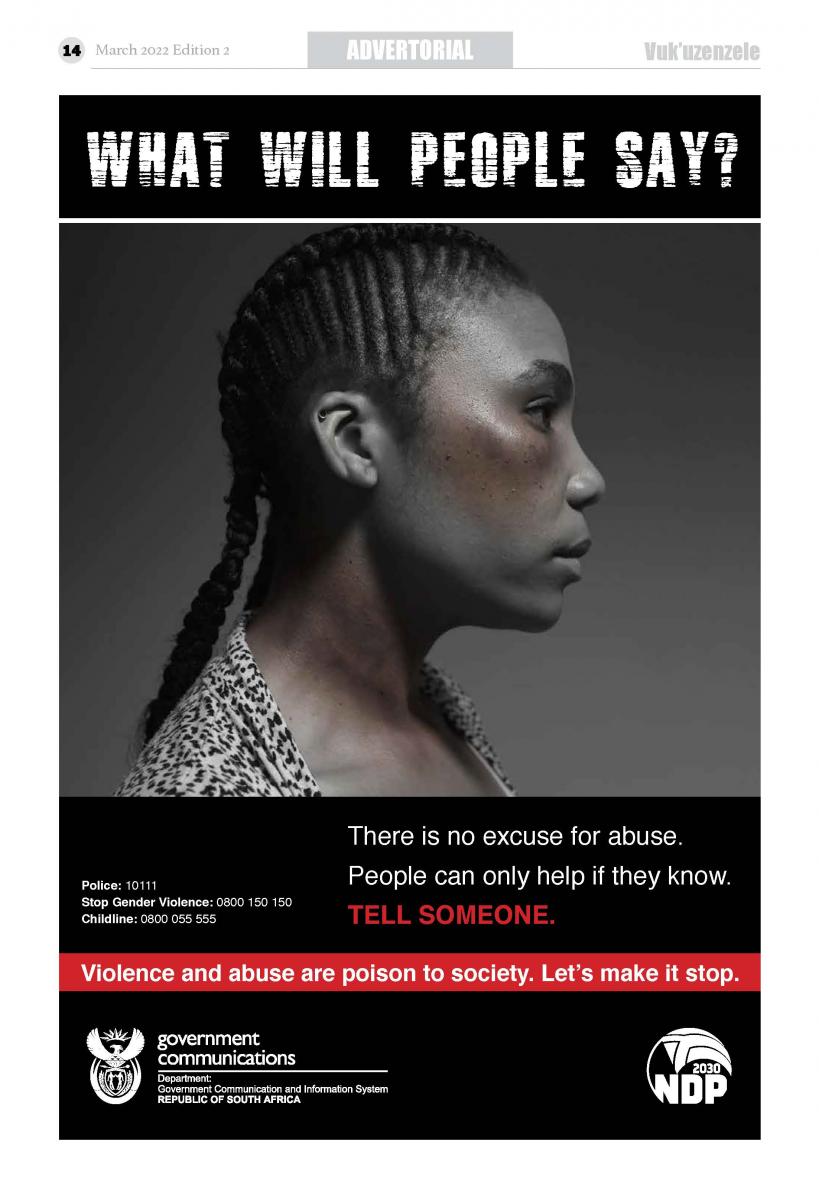
Winning story to be brought to life
Winning story to be brought to life UrsulaThe Western Cape Education Department (WCED) is calling on all Grade 4 learners in the region to enter the 2022 Story Stars essay competition.
Launched in 2020, Story Stars is the fictional adventure of Felix and Felicity.
Interested Grade 4 learners will need to write an essay about the characters’ latest adventure.
The winning story will be published and distributed to local schools and also be the basis of an animated film.
In addition to being the star of the video, the winner will receive a tablet, book bag and branded stationery.
The winning school will receive R10 000 for learning and teaching support material, and the relevant teacher will get a R2 000 gift voucher, book bag and stationery.
The second and third prize winners will each receive a tablet, book bag and stationery.
Western Cape Education MEC Debbie Schäfer says the competition was created to get learners excited about reading and creative writing.
“Our 2019 survey of a class of Grade 4 learners showed that their interests lay more in watching cartoons and becoming YouTube stars.
We decided to create a competition that encouraged reading and creative writing, that could ultimately result in an animated film – written, narrated and starred in by the winner.”
MEC Schäfer adds that Grade 4 teachers have been given all the competition information. The top three entries from each school will be entered into the provincial competition.
She says that reading and writing are an important part of a child’s development and exposing children to books at an early age helps with their vocabulary development and language skills.
The 2021 winner, Xia du Toit from Laerskool Mikro, penned the story Afrika Kinders (Africa’s Children), a narrative about Felix and Felicity finding themselves in the Kruger National Park.
“My family and I visit the Kruger National Park often. It is our favourite holiday destination and it was where I wanted to send Felix and Felicity. I was very surprised and overwhelmed when I saw how my story was shaped into an animation,” she says.
How to enter
The competition guidelines, application forms, story booklet and animation film can be found on www.wcedonline.westerncape.gov.za.
Emailed entries can be sent to media1.media1@ westerncape.gov.za. In the subject line, type: Story Stars Essay Competition 2022.
Hand-delivered entries can be dropped off at: Edumedia (WCED), 3 Station Road, Mowbray, Cape Town, between 8am and to 3:30pm (Monday to Friday).
The deadline for entries is 15 April.
Working on Fire transforms lives
Working on Fire transforms lives UrsulaSello Matlhare (32) has proudly served Limpopo as part of the Working on Fire (WoF) team for the past 12 years. 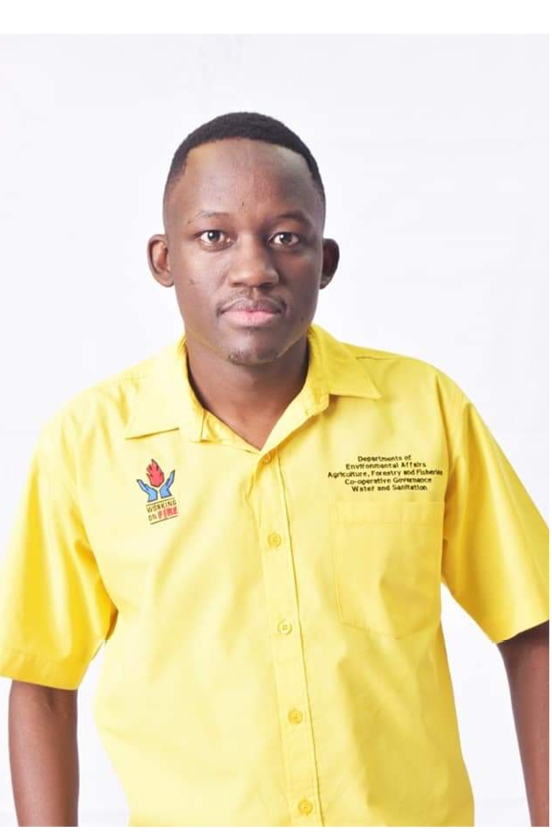
WoF is an Expanded Public Works Programme funded by the Department of Forestry, Fisheries and the Environment. It was launched in September 2003 as part of a government initiative to create jobs, save lives, and protect the environment.
As a Community Fire Awareness officer, it is Matlhare’s job to educate people on how to prevent fires and raise awareness of the work done by WoF.
Without the financial means to study further after matric, he joined WoF in 2010.
He says that WoF was recruiting young people to be trained as fire fighters, and he jumped at the opportunity. After passing the fitness tests, he was selected for the programme.
Matlhare did well and was given several promotions – progressing from first aider to health and safety representative, and then crew leader.
He helped establish three bases, namely Mogalakwena Base in 2011, Polokwane Base in 2013, and Leseding Base in 2014.
In 2015, he was appointed to his current position of Community Fire Awareness Officer.
He says passion and dedication drove him to reach greater heights.
“I’ve always been a hard worker and through this programme, I realised that I had an opportunity to change my life. I made a decision to remain committed to the course and now I am happily reaping the rewards of my hard work.”
Being part of WoF has changed his life, he says. “For starters, I accumulated leadership and management skills. Through these skills, I was able to establish new teams to create more opportunities for other young people in the province.”
How to join WoF
WoF bases recruit fire fighters as and when needed.
Participants must be between the ages of 18 and 45, must have passed matric, and be physically and mentally fit.
Limpopo Communications Officer for WoF Ofentse Letswalo says there is a rigorous and demanding physical selection process.
WoF employs more than 5 000 young men and women, who have been fully trained as veld fire fighters and are stationed at more than 200 bases throughout South Africa.
For information on recruitment in your area, contact one of the WoF provincial Offices:
- North West (Potchefstroom): 018 290 8512
- Free State (Bloemfontein): 087 352 4814
- Western Cape (Cape Town): 021 532 1516
- Limpopo (Polokwane): 087 352 4836
- Gauteng (Midrand): 011 314 0254
- Mpumalanga (Nelspruit / Mbombela): 013 752 7047
- KwaZulu-Natal (Hilton): 087 352 4816
- Eastern Cape (Stutterheim): 087 352 4893

